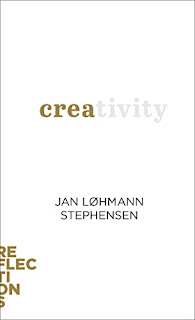Creativity and work
‘Creativity’ on LinkedIn’s Soft Skills list
We simply crave creativity. Everyone seems to do so. Politicians. Researchers. Businesses. Customers. Employers and Employees. No one can get enough of it.
A good example of this is on LinkedIn's online Learning Universe:

Here, 'creativity' in consecutive years has topped the list of so-called ‘soft skills’, that companies are looking for in potential applicants to fill in vacant position, that is: in job advertisements.
And, in fact, it has topped the list alongside other skills that are closely associated with creativity, at least as we've come to know it — or: as we’ve invented and re-invented it — the last decades, namely, as something that also has to do with 'collaboration' and 'adaptability' (which both also made the top 5 many years).
And yes, I know, LinkedIn is a special kind of Hell on Earth. A place where people are overly enthusiastic about their work lives, about their own merits, and about the companies that employ them (or the companies they've started themselves). A place where all these people gather to celebrate work, business and themselves and each other (or at least: pretend to do the latter, as the code of conduct goes in there). So, obviously, LinkedIn does not represent work or organizational life at large. After all, the world is saner than that. But still, LinkedIn is a pretty good indicator of how the world of work and business thinks of itself. Where hegemonic/mainstream thought on what work is — and what it should be — is at these days. And it very much thinks of work in terms of creativity.
This is partly because creativity has become associated with 'the new', 'novelty', 'disruption', 'usefulness' and 'profitability', 'working smarter' and all these other ‘innovation’-related notions (which we're all thrilled about as well!). And partly because creativity at the same time has retained this flavour of freedom, of self-realization, and of something truly human. And in sum, all these factors, all this strategic, or perhaps better: productive ambiguity — since it’s not like someone is trying to trick someone else — add to the feeling that creativity is really really necessary, and really really good.
And I'm not saying it's not. The importance and the benefits of what we call 'creativity' is certainly part of the story.
But there is no such thing as a free lunch.
All this focus on creativity comes with a price. More specifically: precarious working conditions, underemployment, exploitation, and so on. And these things especially trouble the so-called cultural and creative industries where the hope of proper employment (and a regular salary) doing something that could miraculously combine the economic necessities of labour with the freedom of creativity makes many people accept unacceptable working conditions they would otherwise not put up with.
The irony to this, is that these problems are actually quite similar to the ones creativity was initially suggested — or invented — to ameliorate. Or at least problems that are also related to the overall economic system and its societal maladies (alienated labour, lack of autonomy, and so on), which creativity was pitched as the cure against.
This is why these highlighted soft skills in the LinkedIn job advertisements are not merely competences or abilities that companies look for in potential employees. It can also be read as a signal for potential workers, saying: “in this company you'll get the opportunity to realise your creativity — or even: to be(come) creative — which is something we know you expect that we expect that you expect that we expect you want to do, and so on, and so on....”. To be creative has become, as Angela McRobbie has pointed out, an imperative. But it has also become some kind of expectation trap (in lack of better words).
This is how hegemonic thought functions: through shared assumptions. In this case: the shared assumption that the human being essentially is a creative being, and the realisation of this in the work place and life would be win-win for all parties involved. Which, is not a very old idea. We've just forgotten that we have, in fact, invented it, and that something like that — the expectation that work not only could, but should be creative — not that long ago would have been unthinkable.
LINKS:
https://www.linkedin.com/business/learning/blog/top-skills-and-courses/the-skills-companies-need-most-in-2019-and-how-to-learn-them?trk=lilblog_12-31-18_creativity-most-important-skill_tl&cid=70132000001AyziAAC
https://www.linkedin.com/pulse/top-soft-skills-2021-jenifer-lambert/
https://www.linkedin.com/business/talent/blog/talent-strategy/linkedin-most-in-demand-hard-and-soft-skills

Kommentarer
Send en kommentar